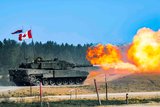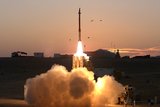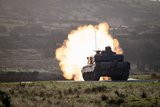BAE Systems lands three-year US Army contract for precision weapons R&D
BAE Systems' current cannon-launched precision munitions include the 155mm BONUS round used by Finland, France, Norway and Sweden. (Image: BAE Systems)
The US Army's Combat Capabilities Development Command Armaments Center (DEVCOM AC) has awarded BAE Systems a three-year contract to continue R&D work on precision-guided munitions (PGMs) to support the army’s long-range precision fire modernisation.
'We have invested heavily to innovate and develop a highly manoeuvrable long-range fires capability that will support soldiers on the battlefield by providing lethality against high-value targets,' said Brent Butcher, VP and GM, Weapon Systems, at BAE Systems. 'We look forward to partnering with DEVCOM AC to continue to advance precision-guided munitions and find the best long-range precision fires solution for the US Army.'
Under this latest contract, BAE Systems will team with DEVCOM AC to advance the capabilities of precision cannon-fired munitions to defeat fixed and moving targets in GPS-degraded or -denied environments at twice the range of existing cannon-launched PGMs.
Related Articles
US Army orders Precision Strike Missiles
BAE Systems reveals details of next-generation artillery ammunition
More from Land Warfare
-
![US DoD task force’s DroneHunter acquisition lays groundwork for Replicator 2 CUAS strategy]()
US DoD task force’s DroneHunter acquisition lays groundwork for Replicator 2 CUAS strategy
As the US Department of Defense looks to counter the growing threat of uncrewed aerial systems to improve homeland security, the DroneHunter acquisition could point to future commercial innovation.
-
![Land forces review: Tanks, trucks and IFVs dominate but woes remain for Ajax]()
Land forces review: Tanks, trucks and IFVs dominate but woes remain for Ajax
This year has begun with main battle tanks taking the lead while orders for large logistics and support vehicles continued from last year. Additionally, two of the British Army’s most significant contracted vehicle programmes, Ajax reconnaissance vehicle and Challenger 3 tank, continued to make news in January.
-
![Canada looking to expedite purchase of armoured fighting vehicle and a new tank]()
Canada looking to expedite purchase of armoured fighting vehicle and a new tank
Canada is improving its Leopard main battle tank fleet but before this is fully completed, it is expected to begin looking for new vehicles.
-
![Layered protection: How air defence is adapting to rising drone and missile threats (podcast)]()
Layered protection: How air defence is adapting to rising drone and missile threats (podcast)
A surge in aerial threats – from advanced missiles to low-cost drones – is reshaping the way militaries approach air defence, driving demand for flexible, multi-layered solutions.
-
![UK agrees parallel development and production process for British Army Challenger 3]()
UK agrees parallel development and production process for British Army Challenger 3
In a bid to accelerate delivery of the British Army’s Challenger 3 main battle tank, which has just carried out its first crewed firings with the latest Rheinmetall 120mm L55A1 smoothbore gun, the UK has opted for an unconventional approach.






















